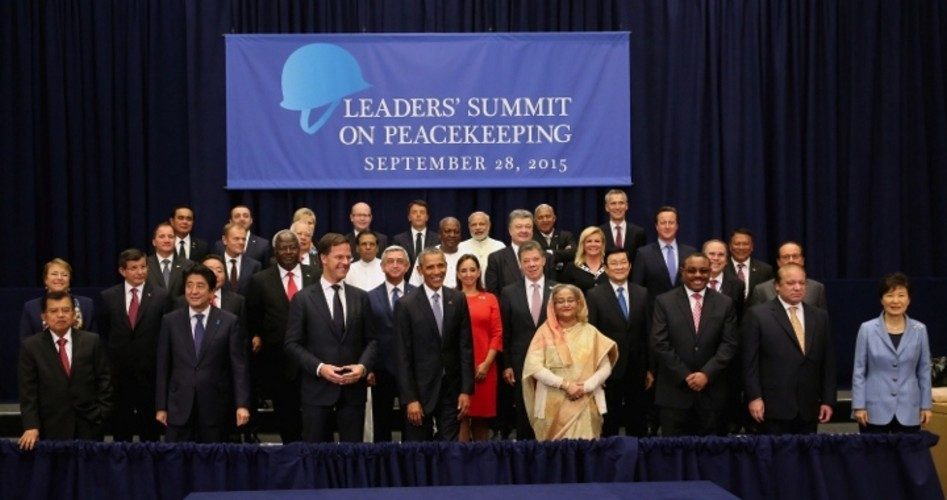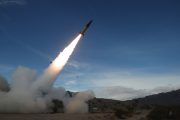
Speaking at a Leaders Summit on Peacekeeping held on the sidelines of the UN General Assembly in New York on September 28, President Obama received pledges from more than 50 countries for 40,000 troops for UN “peacekeeping” forces. Among the nations that increased their contribution was China, whose president, Xi Jinping, offered to set up an 8,000-strong standby police force. Colombia, participating for the first time, pledged to send up to 5,000 troops.
In his address to the summit, Obama told the leaders of other nations that peace operations were “experiencing unprecedented strains” and are being deployed in “more difficult and deadlier conflicts.”
“We know that peace operations are not the solution to every problem,” stated Obama, “but they do remain one of the world’s most important tools to address armed conflict.”
AFP reported that Obama opened the summit by announcing the addition of 30,000 new troops for the UN’s so-called peace missions, but after national leaders went to the podium to announce their contributions, the number reached 40,000.
More than 125,000 troops and police from 124 countries already participate in the UN forces. Interestingly, AFP reported that there are just 78 Americans serving in UN “peace missions,” but the United States remains by far the largest financial backer, providing 28 percent of the UN peacekeeping budget of $8.3 billion. The United States is one of 193 nations belonging to the UN and has less than five percent of the world’s population.
In addition to his speech at the summit on the 29th, Obama also addressed the UN General Assembly. Early on in his speech, the U.S. president utilized some of the favorite buzz words and catchphrases often employed by internationalists such as those who forged the UN, including “international system,” ”international order,” and “collective endeavor.”
Further along, Obama delivered his punch line:
And that’s why we should celebrate the fact that later today the United States will join with more than 50 countries to enlist new capabilities — infantry, intelligence, helicopters, hospitals, and tens of thousands of troops — to strengthen United Nations peacekeeping.
Though Obama’s focus was on so-called UN peacekeeping operations that employ conventional weaponry, the subject of nuclear weapons did come up in his speech:
After I took office, I made clear that one of the principal achievements of this body — the nuclear non-proliferation regime — was endangered by Iran’s violation of the NPT [ Non-Proliferation Treaty]. On that basis, the Security Council tightened sanctions on the Iranian government, and many nations joined us to enforce them. Together, we showed that laws and agreements mean something.
But we also understood that the goal of sanctions was not simply to punish Iran. Our objective was to test whether Iran could change course, accept constraints, and allow the world to verify that its nuclear program will be peaceful. For two years, the United States and our partners — including Russia, including China — stuck together in complex negotiations. The result is a lasting, comprehensive deal that prevents Iran from obtaining a nuclear weapon, while allowing it to access peaceful energy. And if this deal is fully implemented, the prohibition on nuclear weapons is strengthened, a potential war is averted, our world is safer.
Dissecting the above remarks, it is evident that they are based on several underlying assumptions, among them being that Obama and his counterparts at the UN regard international law as being superior to national sovereignty, that the Security Council has the authority to impose sanctions on nations not complying with UN dictates, that sovereign states should “accept constraints,” and that the UN has the authority to prohibit nuclear weapons — a prohibition that must be strengthened.
Some may argue that all that is fine, since the leaders of Iran are obviously “the bad guys” and should be held accountable. The problem is, who has the authority to decide who are the “bad guys” and who are the “good guys”? The UN?
If the determination is made on whether a nation has a good record on human rights, why are communist nations with very poor human rights records, such as China, or questionable human rights records, such as Pakistan, permitted to possess actual nuclear weapons free of UN sanctions? (North Korea, with perhaps the worst human rights record of all, incurred UN sanctions only after it conducted tests of operational nuclear weapons.) In contrast, Iran, which not only possesses no such weapons, but has never been proven to be in the process of developing them, has been the target of sanctions.
To fully understand the objective of those who would make the UN the sole arbiter of who should or should not possess nuclear weapons, it is necessary to look back at another speech made before the UN General Assembly by an American president.
In a speech on September 25, 1961, John F. Kennedy stated:
Let us call a truce to terror. Let us invoke the blessings of peace. And, as we build an international capacity to keep peace, let us join in dismantling the national capacity to wage war.
This will require new strength and new roles for the United Nations.
Further along, Kennedy continued:
For 15 years this organization has sought the reduction and destruction of arms. Now that goal is no longer a dream — it is a practical matter of life or death. The risks inherent in disarmament pale in comparison to the risks inherent in an unlimited arms race.
It is in this spirit that the recent Belgrade Conference— recognizing that this is no longer a Soviet problem or an American problem, but a human problem — endorsed a program of “general, complete and strictly an internationally controlled disarmament.”
And what international body would be given the authority to control disarmament? The UN, of course!
As Kennedy got closer to making his point, he stated:
The program to be presented to this assembly — for general and complete disarmament under effective international control — moves to bridge the gap between those who insist on a gradual approach and those who talk only of the final and total achievement….
It would achieve, under the eyes of an international disarmament organization, a steady reduction in force, both nuclear and conventional, until it has abolished all armies and all weapons except those needed for internal order and a new United Nations Peace Force. [Emphasis added.]
The program of which Kennedy spoke was entitled Freedom from War: The United States Program for General and Complete Disarmament in a Peaceful World (State Department Publication 7277).
Excerpts from the document include:
• “Disarmament shall take place as rapidly as possible until it is completed in [a program of three] stages containing balanced, phased and safeguarded measures, with each measure and stage to be carried out in an agreed period of time.”
• “As states relinquish their arms, the United Nations shall be progressively strengthened in order to improve its capacity to assure international security and the peaceful settlement of differences as well as to facilitate the development of international cooperation in common tasks for the benefit of mankind.”
• “By the time Stage II [of the three-stage disarmament program] has been completed, the confidence produced through a verified disarmament program, the acceptance of rules of peaceful international behavior, and the development of strengthened international peace-keeping processes within the framework of the U.N. should have reached a point where the states of the world can move forward to Stage III. In Stage III progressive controlled disarmament and continuously developing principles and procedures of international law would proceed to a point where no state would have the military power to challenge the progressively strengthened U.N. Peace Force and all international disputes would be settled according to the agreed principles of international conduct.” (Emphasis added.)
The French have a saying: “Plus ça change, plus c’est la même chose,” which translates as “The more things change, the more they stay the same.”
Fifty-four years ago in September, one president presented a plan to disarm the United States and turn our nuclear weapons over to a UN “peace force.” A partial implementation of the objectives of that plan has been achieved over the years though bilateral treaties — e.g., the 1987 Intermediate-Range Nuclear Forces (INF) Treaty, and the New START (Strategic Arms Reduction Treaty) Treaty ratified by the Senate in 2010 — entered into by the world’s two largest nuclear powers, the Soviet Union/Russia and the United States.
Though the widespread publicity about 7277 disseminated by organizations such as The John Birch Society generated concern among Americans and slowed down the plan, internationalists in our government have never stopped implementing it in bits and pieces, either by treaties such as the INF and START, or as President Obama has just done, by attempting to build up the UN “peacekeeping” force.
When we look through the Kennedy and Obama speeches and the Freedom From War document that Kennedy presented, it is interesting to identify the things that both presidents said must be strengthened: “United Nations peacekeeping,” “the prohibition on nuclear weapons,” “the United Nations,” and the “U.N. Peace Force.”
Those who cherish freedom, U.S. sovereignty, and independence want to strengthen only our government’s ability to fulfill its purpose as defined in the Declaration of Independence and the Constitution — to secure our rights and to provide for our common defense.
Our participation in the United Nations is counterproductive to these ends, and should be eliminated.
Photo: AP Images
Related articles:
Obama Plots Huge Boost to UN Military Amid Child-rape Scandals
Sex Abuse by UN “Peace” Troops Becoming Global Scandal
UN “Peace” Forces in Haiti Prey on Civilians, Children
UN Troops in Mali Slaughter Civilian Protesters
UN “Peace” Armies to Drastically Expand with Obama’s Support
UN “Peacekeeping” Military Using Drones, With Obama’s Support




